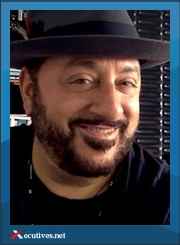
Frank Coraci
Frank Coraci, born in 1966, is an American film director, actor and screenwriter. He graduated from New York University’s Tisch School of the Arts in 1988 with a bachelor’s degree in Film, where he shared a dorm with US actor Adam Sandler, the beginning of a long-term friendship that has resulted in various films Coraci produced and directed with this Hollywood comic superstar. Most movie fans might know Coraci for films such as «Here Comes the Boom» with Kevin James in the main role, a teacher who tries to get money in order to safe his school from bankruptcy; or „The Wedding Singer“ with Adam Sandler and Drew Barrymore in the main roles. For his movie «Click» Coraci was awarded with the 2007 People’s Choice Award For Favorite Movie Comedy. „Around the World in 80 Days“ based on Jules Verne’s novel of the same name, is a tremendous adventure comedy perfectly made for families, with actors such as charming Jackie Chan, Steve Coogan, Jim Broadbent, amazing Cécile de France and Arnold Schwarzenegger in a brilliant scene, making hilarious fun of the larger-than-life stereotype we know him as from his blockbuster movies.
Frank Coracis films are based on very good books and screenplays, and they often have a deeper background that Coraci knows how to convey convincingly and sincerely. He calls his approach ‚emotional honesty‘. Even if his films initially seem merely laugh-out-loud funny and whimsical, there is a philosophical depth to his works that touches many viewers. This hidden profundity, and his good feeling for great actors, many of whom are superstars, such as Kate Beckinsale, Christopher Walken and Salma Hayek, make his films convincing works that will continued to be watched far into the future. In the interview with The Swiss Culture and Management Network Xecutives.net, he talks about how he approaches his cinematographic works, how he works with actors and also comments on the current Me Too debate that is going on in Hollywood and is not yet over. Coraci will take part in the Basel Gässli Film Festival 2018, initiated by Swiss film director and producer Giacun Caduff, where he will share with young filmmakers his insight on film-making.
Xecutives.net: Mr. Coraci, I think that your films are very well made and their success is quite evident. It seems that you embody the very Hollywood mainstream and its entertainment industry in an impeccable way, where you combine commercial success and critical acclaim. I’ve noticed that in many of your motion pictures the stories are superb, as well as there is a dazzling selection of very well known actors. But I was particularly fascinated by the dramaturgy of „Click“ with Adam Sandler and „Here Comes the Boom“ with Kevin James in the main role. You are able to create tension arcs that invoke passionate engaged feelings of tenderness, sadness and love in the audiences of your films—even for my kids!–who then become very emotional watching climactic scenes. In “Click” I had the feeling of wanting to cry—as I had tears in my eyes and in the other movie I found myself also becoming quite emotional, and ultimately very moved. How do you do manage to trigger such emotionally satisfying catharsis in us? In addition to very good actors and stirring music, what means do you use to create these tension arcs in your cinematic works?
Frank Coraci: First and foremost, I don’t feel like I’m making comedies, I’m making movies that happen to be funny. The script? That’s the blueprint. Spending the right amount of time making sure the script is emotionally honest is a big part of my job. Therefore, the choices the characters in the film make can’t feel contrived. That’s really important. If somebody has to make a big decision then the audience must understand the complications that come with the decision – the sacrifices the decision forces versus the rewards. Especially in a movie like “Click” where you have this remote that he gets to «help his life». In the original draft of the script, it read really funny, but it read like the remote was just a bad curse he got. And it was very important for me to make sure it was a very Faustian tale. You know, sometimes we rely on the storytelling that’s worked for centuries. And to me, Adam Sandler’s character Michael Newman had to have a moment where he was warned by Morty, his archangel…
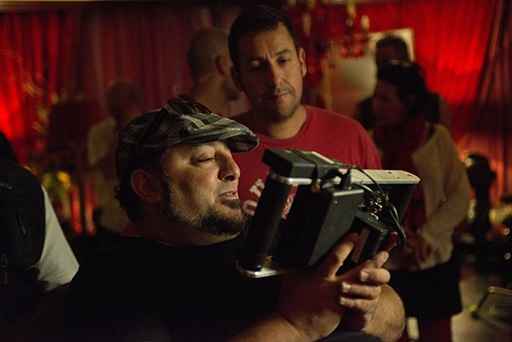
Frank Coraci & Adam Sandler on the set
Xecutives.net: … ah, you mean Christopher Walken – in a brilliant role!
Frank Coraci: Yeah, Christopher Walken. And I actually wrote the scene where he goes to his place at night and it’s kind of haunted, and he basically warns him that the remote is learning his preferences, that whatever choice he makes matters. I’m sure if I hadn’t made the movie, somebody else would’ve figured that out. But without that scene, for me, the movie would’ve just have been about a haunted remote, it wouldn’t have been a specific man’s story about the decision he makes, so he learns a lesson by the end. But I think in general, you make sure that the movie is emotionally honest – and that goes from the script and every scene I direct I feel like I’m thinking about the actors, and I have to make it emotionally honest for them. A lot of times in movies to make things funny or dramatic, you need some sharp turns, that may not be emotionally honest. You have to find a way to direct a scene so it is honest.
Another example is in “The Wedding Singer”. It was in the script that Glen Guglia admits to Adam Sandler’s character that he’s cheating on his wife, played by Drew Barrymore. And when I saw the script I thought, that’s a really tough scene, because he knows that Adam Sandler’s character is best friend’s with Drew Barrymore’s character, so why would he admit his guilt? But I found a way to make it all about the character’s ego, where he sees a hot waitress and we see Adam cleverly paint him into his ego, where he says, “You used to get girls like that, but not anymore!“ It baits Glen into saying „I get them now, hotter and younger“. And to me, on the page it read as contrived, but when you think about how to arrange the scene, and change it a tiny bit, you can make a scene take a big turn that’s hard to be emotionally honest into one that is emotionally honest. As long as you’re sensitive to what makes people make certain choices. I think it’s my job as a director to make it emotionally honest, so when you cry you don’t feel like you’re being manipulated, you’re just taking the ride of the story and you trust the story: The story never deceives honest emotions.
I’m honored that you’re saying this and having this reaction to my movies. I’m honored because it’s always been a dream of mine to make films that are emotionally honest. There’s a part two as well to this, where although my films are comedies, they’re always grounded in a reality. Every movie has a slightly different reality. You have to understand what the reality of that movie is. The reality of “The Waterboy” may have been a little bit more over the top than say, the reality of “Click” or maybe “Here Comes The Boom” but it’s not that far off. Even “The Waterboy” where Adam plays a really silly character, when I directed it and discussed it with Adam, we didn’t want to play it just as a caricature. We felt that Bobby was kind of a real guy we all grew up with who was emotionally and mentally not all quite there, but had a sweet heart, and so some of the choices we made are funny, but it’s not somebody who couldn’t accept in the real world. Kind of like Dustin Hoffman in “Rain Man” a little bit. The key is to anchor in the reality that’s set, and then people will trust you and take the emotional ride. There’s a third part, which is we do have a good rhythm in some of the movies I make, particularly with Adam, where it’s kind of the opposite of a black comedy. In a black comedy, you’re laughing, you’re laughing, you’re laughing, and then you shoot somebody in the head, and then your guard goes down and your emotions are not on guard, and it’s disturbing. We do the opposite. We get to the point early in the movie where it’s about to get emotional, and before it gets sappy, you know, where you roll your eyes, we make everybody laugh. So you’re not afraid to go along with the emotion. Then, by the third act, you’re trusting the film making so much, we’re often able to get people to trust us, and be able to get into the feelings instead of thinking, oh, I’m being manipulated.
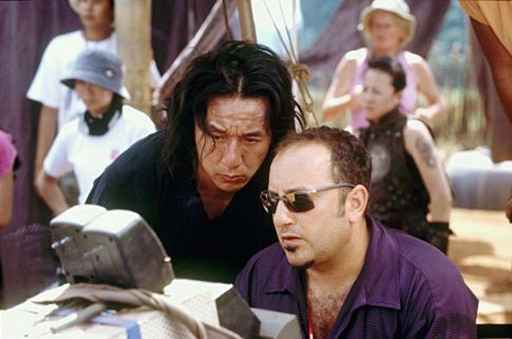
Frank Coraci & Jacky Chan on the set
Xecutives.net: I’ve also seen “Around The World In Eighty Days” and I’ve rarely seen a movie with my entire family that was such a success for all of us. Let me ask you another question because you mentioned „emotional honesty». I think I understand what you mean and say. Nevertheless, even as you work very well as you do, the success of a film can never be guaranteed, not even with the best actors and the highest budget. Nobody has yet found this recipe for making a financially worthwhile film on demand. But there are undoubtedly certain principles that, if followed, can contribute to a film’s ultimate success. Which principles of commercial success are these for you personally? You said emotional honesty was key, but can you tell me which are the principles of commercial success, your principles that you follow, your personal principles?
Frank Coraci: I don’t know if I’m the perfect person to come up with the perfect principles, for as much as “The Waterboy” and “The Wedding Singer” and “Click” performed really well. “Around The World In 80 Days,” which is one of my favorites of the films I made, when it came out it didn’t performe that well. And to be honest, so much of that has to do with marketing, and things like that. It’s hard as a film maker to be involved with all of the marketing. A studio has to put sometimes up to 50 million dollars in advertising. I don’t say that I’m an expert in marketing. I try to make movies that people see and tell their friends “go see that movie, you will love it“. I never tried to make movies that tried to make a lot of money. I hope they do, because the main thing is, I want to make movies for the rest of my life. Every time I make a movie that has some success it ensures Hollywood, and then I will be able to direct another movie again. So I don’t have any secret formula for success. I do know that the popularity of actors really helps in the commercial world. But that also changes sometimes. I wish I could answer this question better! (Laughs)
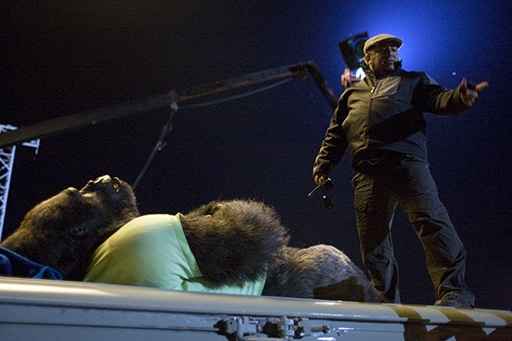
Frank Coraci in action
Xecutives.net: This leads me to my next question. How much freedom do you have as a director in implementing film projects in the film business, which has been described by Howard Suber as almost an industrial assembly line, following industrial and entrepreneurial principles as in a automotive or chocolate industry? It’s about money and turnover. However, how much influence do the producers or even the superstar actors have when it comes to film ideas or projects in Hollywood?
Frank Coraci : Well, I think movie stars hold the most sway in some way because when it comes to commercial films. But even in independent films, to get a film going, it will only get the go ahead when it has a movie star. Of course that holds true for commercial films. So they do hold a lot of the power, and so if the movie goes on the basis of a movie star, they will definitely have a lot of influence when it comes to other casting choices, you know, script notes, and everything. And the reason for it, to give you the financial side of it – when the movie is in the theatres the first weekend, the studio which made the film collects ninety percent of the money, and the theatre gets ten percent. By the fourth week it’s fifty/fifty. And by the eighth week it’s ninety/ten, that is to say, the theatre gets ninety percent of the money and the studio inversely gets ten. What that does is incentivize movies to make a lot of money the first one, two weekends. So when the film „Titanic“ first came out, it wasn’t really about the actors, right? So it opened up at a certain number, I think it was like twenty five million dollars, but I don’t remember. It actually gained in box office thanks to word of mouth, and it lasted in the theatres for many, many weeks, it was such a hit! It was successful because it made a massive amount of money, but it would have been even more successful for the studio if it had been the first week where they made all the money.
Xecutives.net: The studio would like to get the film to make most of the money in the first two weekends. So how do you do that?
Frank Coraci: You get a movie star! Which is why movie stars salaries started going up so much higher. And that’s, to come back to your question, when the whole industry shifted to the movie stars having a lot of the power creatively, since they’re able to hire friends, the director they wanted, that kind of thing. Now, we are in another kind of shift now, because the movies that play in theatres really well are starting to become more Marvel comic book movies – the big action movies. So it’s shifting things all around, and now films are starting to go straight to Netflix, or to video on demand. I couldn’t tell you exactly where it’s going, but it is shifting from stars, especially with comedies, where the big movie star is the focal point for the studio. That make sense?

Frank Coraci – Spanknyce Films
Xecutives.net : Absolutely! Let me go to my next question, which is linked to that question. There’s a lot of humor in your films. I’ve got the impression also there is also a lot of joy, in the movies, on your sets. You cast top rate stars who engage in very funny scenes, such as Christopher Walken as the dark angel Mordi, or Kevin James the boxer, or Arnold Schwarzenegger. Especially the latter has a prominent role in your film “Around the World in 80 Days” and makes fun of himself. My kids found this movie very, very funny. Actors like Schwarzenegger presuppose that they like their role, they feel very comfortable in their skin. Are these stars just very good actors, or do they actually possess an innate sense of humor within themselves which you specifically look for during casting, and which they bring across in your films? For instance, Arnold Schwarznegger?
Frank Coraci: Okay, so Arnold, from the first time I saw him in movies, after the Conan films and the more serious ones, especially „Total Recall“, which is a movie by Paul Verhoeven, who is a director I always admired, when I saw him in that movie, I thought, here’s a guy who’s really self-aware. He’s able to make fun of himself. I’ve been a fan of his now for a long time. I realized what a very intelligent man he was. To be able to be objective about yourself is a smart and vital quality for an actor. I always knew he had the ability to present himself as very funny. At one point, he’d seen “The Waterboy” and had a real liking for it. The relationship between the mother and the son he particularly liked. And he actually asked to meet with me. We had a wonderful meeting where I sat and smoked cigars together with him and we talked about making a project. Nothing ever came of it, but then years later, when I was doing “Around The World In 80 Days” I thought, what a funny casting to have him as Prince Hapi, and this was right before he became the governor of California. And so I thougt on top of it, it’s even more of a funny thing to imagine the governor playing what was a comedically funny edgy role, a bit sexist – again, this is pre-Me Too moment! (Laughs) But I think all the jokes were in good taste. So yes, he was quite brilliant at being funny. As far as casting, being funny is super important, the actor has to have the ability to be funny. The second thing is, I do create an atmosphere on the set that is really fun, and it’s easy to be distracted when you’re making a movie with so many worries – there’s the weather, the camera, and on and on – you have to make sure as a director that you’re there a million percent for the actors. Every time they do a take, every time they make a joke, you are basically there to laugh. I literally tell my crew, when I call cut, if you think they’re funny, laugh out loud because the feedback, when you’re trying to be funny, is so important. The more you hear people laugh at your jokes, the better. Because it’s different if you’re on stage or doing standup or performing a play, you hear the laughter. When you’re doing a movie, a lot of times, everyone’s distracted. They’re worried about their job. But you’re still in front of a hundred people. And if nobody laughs at the end of a take, it can be misconstrued, because you’re very vulnerable as an actor, that you’re failing at the comedy. I literally make sure that everyone knows to be responsive after I call cut.
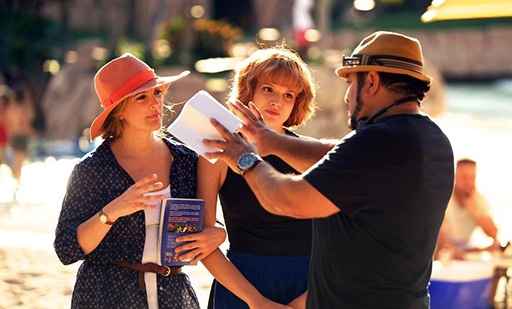
Frank Coraci Drew Barrymore & Bella Thorne on the set
Xecutives.net: I think you had a great time there with Arnold Schwarznegger, because I think he was super funny! He was great!
Frank Coraci: Yeah, he was super funny, and I kind of wrote the scene to play into his ego. And I literally remembered there was something about him yelling, “not my statue of MEEEEE“ and “My arm! My arm!” There was something about him being so vain, full of himself. It was literally written for Arnold, you know, his giant muscles, it was playing into what we know about Arnold and his very bold ego. He knew exactly what he was doing. He was on the campaign trail for the governorship, and I wanted him to see the scene, because he had to approve of the marketing. I played him this scene, and he’s smoking his cigar and he’s in a suit – he was about to do a political speech – and he watches it before he goes out and he turns to me with the cigar in his mouth and he goes, “You’ve done it again, Frank!”. For he felt like the movies of mine he really liked, I’d made him look as funny as he’d hoped to be. So I was kind of honored that I’d made Arnold happy.
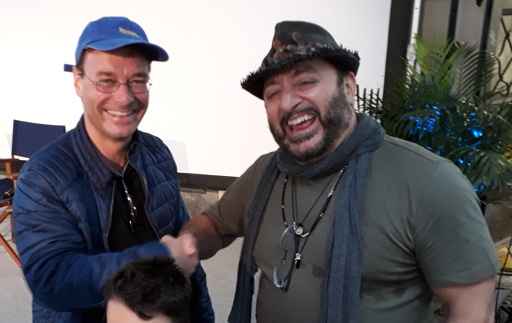
Christian Dueblin & Frank Coraci at the 2018 Gaessli Film Festival
Xecutives.net: And so this again leads me to my next question. «Around The World In 80 Days», which I’ve seen with my kids, who shouted and laughed while watching the movie as much as they did when they saw Spielberg’s «E.T.», reminded me very much of other older classic adventure comedy epics, such as for instance Chitty Chitty Bang Bang or Doctor Doolittle, movies my kids know. My daughter mentioned those movies while watching «Around the World in 80 Days», a sharp observation on her part. Have you been inspired by such earlier movie masterpieces, and can you even profit from them today, just for instance getting inspired by some ideas or personalities and actors? Does this have an effect on you, those older movies?
Frank Coraci: Definitely at some point when I realized I wanted to make movies because it was important when as a child, they shaped my mores, my values, and I realized it’s a big responsibility. And I felt like it was part of what I could probably do, which is to tell a story that has some good mores and values. I always think about kids watching my movies, and I think about watching a movie with my Dad when I was a kid, and the ones we would talk about. And they did include “The Wizard of Oz” and “Chitty Chitty Bang Bang” for sure. The movies I remembered laughing at with my Dad were things like “Young Frankenstein” by Mel Brooks, and movies like “History of The World.” And forever we’d make jokes. Even James Bond movies. Forever we’d reference them, all through my childhood, growing up. So I thought about making a movie when I made “Eighty Days” that parents and daughters and sons could watch it together, and laugh, and then maybe imitate it. Or you know, have some common ground where they were all happy together. So the message of “Eighty Days” was important to me. I thought in so many ways Phineas was an identifiable character, because on one level, he was quite open-minded, but on another level, he was very insecure with his art and science. And I wanted it to inspire kids to have the motivation to take a chance on life that they believe in creatively. And also, the travel. It’s super important to open your mind, and to be open to other cultures. In so many ways I felt that story was a great moral tale to tell, and to teach kids. We all have that fear in the thing we want to pursue. For me, it was moviemaking. And the fear, “I could never do this“. Phileas believes he can fly, but he was nervous and up against a lot of doubters. So he took a journey where he could meet interesting people and learned about love and was able to travel the world. It opened his mind up, and got to meet people like the Wright Brothers, he learned things. So it’s a very open-your-mind, find-love and travel, make yourself a better person, don’t be afraid of the challenge experience. It felt like a perfect thing for a young child, an eight-year-old or a teen to watch with their parents, because it was such a good message to give them to pursue their dream. So I felt like I was doing something good. I was influenced by knowing how so much as a kid, you shape your whole value system from movies. My generation did. I think they still do. Some kids are on the Internet and on their I phones more, and I hope they still get the longer format storytelling. But it sounds like you watching with your family is a great thing to do. That’s what I always dreamed about providing. It’s so great to hear that. To have such a great collective experience.
Xecutives.net: My kids very much liked the one scene, this Jackie Chan scene, when he says, “What Buddha?” I’ve had to rewind the movie about twenty times, they wanted to see that scene over and over. It’s so funny.
Frank Coraci: Great! That’s funny. I wrote that line, because I thought, Jackie Chan, whose English is so terrible, is going to make fun of somebody whose English is also terrible. (Laughs)
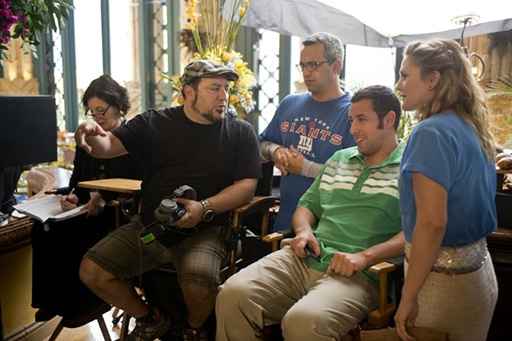
Frank Coraci on the set of Blended with Adam Sandler & Drew Barrymore
Xecutives.net: It was definitely the best scene for my kids. Now I’m going to ask you a question, a little more serious. You have worked with female superstars such as Kate Beckinsale and Salma Hayek, who in my opinion are great actors and of course have with goddess looks and dramatic expressions that appeal to many different kinds of people. The «Me Too» debate has reached the whole world, and Hollywood hit the headlines unexpectedly and suddenly in a way it did not expect. Powerful male players in Hollywood have been toppled from their thrones of creative influence because they allegedly sexually harassed or even attacked many of these A-list women actresses. What experiences have you had with female stars in this respect, and what is the impact on the movie industry and on the empowerment of women in our society in general? Do you feel that change that has taken place in the last eighteen months?
Frank Coraci: This is how I feel about it. I feel that anybody who’s a good human being has nothing to fear or be worried about. I think if you respect women, the same rules now as applied eighteen months ago or 100 years ago. I think there’s rules between men and women. I think consent rules have always been there and are fair rules, and any decent human being has respected that. So, when people start to complain that everything is getting too touchy, and say, and you can’t do anything, I disagree. I’ve just been living the same life, and nothing’s changed for me. Now, what has happened – and it’s negatively affected me in one way – but I’m also fine with it, because I’m very much about women’s empowerment, is that right now there’s a lot of jobs for directing that will go right away to a woman instead of a man, and I have no problem with that. I feel like there was a little imbalance before. And I think it’s compensating. I do think that as a man working in the industry, the amount of jobs has become less, which I’m fine with, because I just think it’s a balancing out. More women working now getting more experience will enable more women to continue to work. I think there’s enough pie to go around, as I say, it’s an expression, like, there’s a big enough piece of cake for everyone. I’m okay with more women getting jobs and directing television and movies. Overall, I think it’s been long overdue that women should be treated with respect. I was shocked at the amount of abuse that had been going on. Even some of these people – I knew of Harvey Weinstein. But it wasn’t apparent to me that things like that were happening. It shocks me that no one else came forward earlier. It’s horrible to find out that so many women were abused. It’s amazing that their rights are now being stood up for, and I think if you’re a decent human being, it’s not going to change your life at all, really.
Xecutives.net: Dear Frank, thank you very much for giving your time for this interview. I wish you much success for your film projects and a great time here in Switzerland.
(C) 2018 by Christian Dueblin. All rights reserved. Other publications require the author’s explicit consent.




